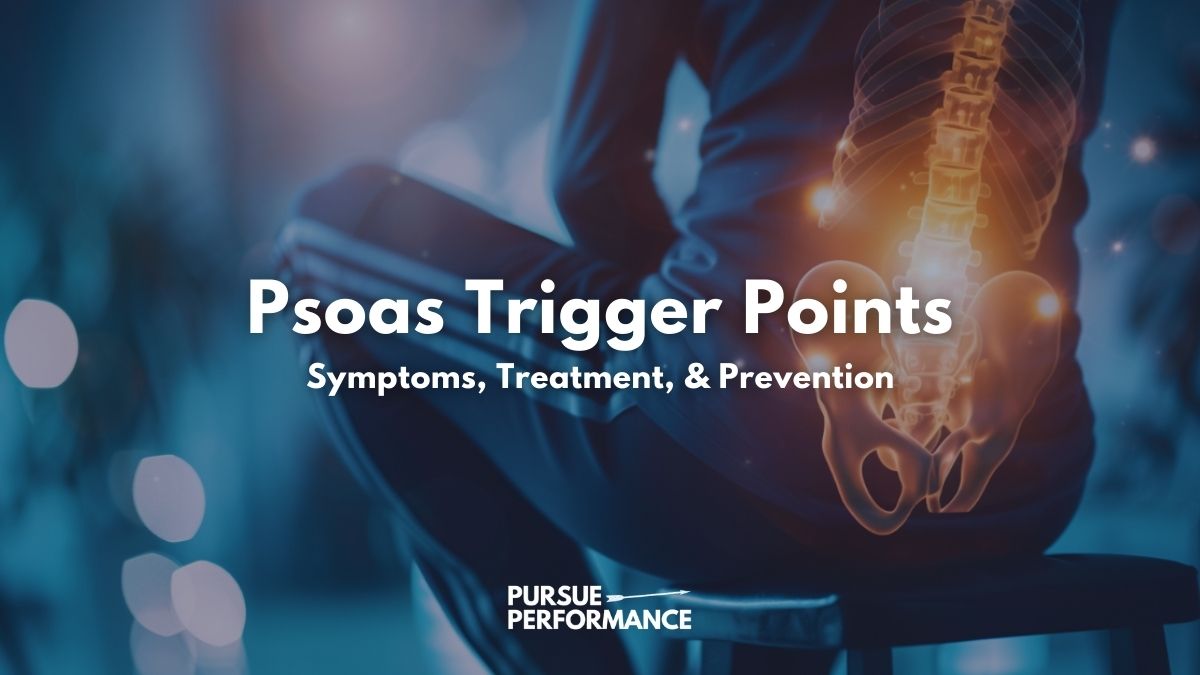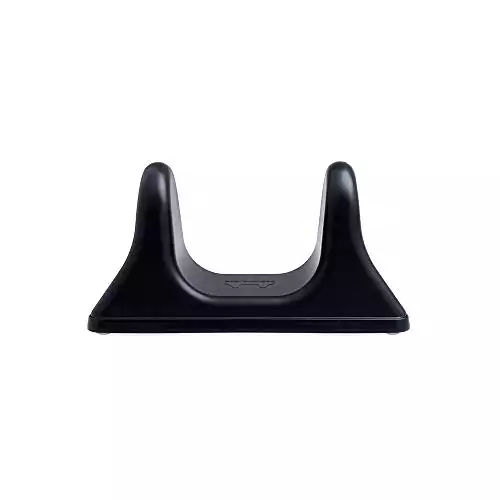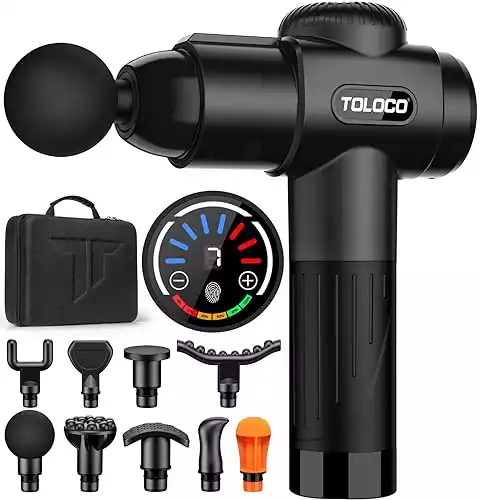Experiencing low back, hip, or thigh pain can often be traced back to a common culprit: psoas trigger points.
When trigger points develop within this vital muscle, they can wreak havoc on your mobility and comfort.
In this guide, we will share everything we know about psoas trigger points, offering insights into symptoms, self-treatment techniques, and preventative measures to provide relief.
Let’s get started!
Key Takeaways:
Psoas trigger points are hyperirritable knots that develop within the psoas major or iliacus muscles near the spine/pelvis. Trigger points stem from sustained muscle tension, poor posture, overload, injuries, or misalignment
Top Picks
Psoas release tool: PSO-RITE
Psoas release ball: Aletha
Massage Gun: TOLOCO
What Is The Psoas Muscle?
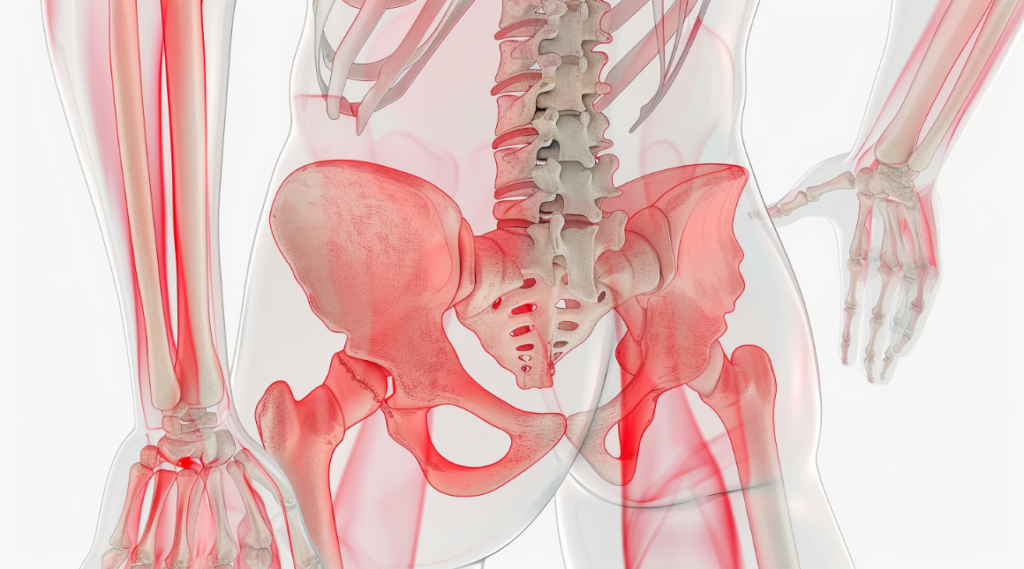
The psoas muscle, alongside the iliacus, forms the iliopsoas group—key players in hip flexion and core stability.
Originating from the lumbar spine vertebrae and stretching across the hip to attach to the femur, the psoas muscle is instrumental in lifting the leg during activities like walking and running.
Its counterpart, the iliacus, originates in the pelvis, joining forces with the psoas to support hip and lumbar spine movements.
Psoas Trigger Points

Trigger points within the psoas can cause various characteristic symptoms depending on their irritability level and location within the muscle belly.
Getting to know these referral patterns helps identify if psoas involvement may be contributing to your pain.
Some of the most common symptoms stemming from psoas trigger points include the following.
Low Back Pain
Trigger points in the upper psoas near the lumbar vertebrae often radiate pain toward the low back.
This manifests as an achy or stiff feeling across the lumbosacral region.
The discomfort typically centers near the L1-L5 areas, depending on the affected muscle fibers.
Changing positions frequently alleviates this type of referred pain.
Hip and Pelvis Pain
Active trigger points in the mid or lower psoas can produce a deep, dull ache through the hips, pelvis or sacroiliac (SI) areas.
This generally presents as tenderness over the hip socket and chronic tightness through the surrounding musculature.
Prolonged sitting tends to aggravate these symptoms.
Related: Massage Gun for Hip Flexor Pain
Thigh and Groin Discomfort
Lower trigger points closer to the femoral attachment commonly refer pain, numbness or tingling down the anterior thigh.
Affected individuals may report sensations near the thigh crease or radiating toward the inside groin.
This often limits hip mobility as well – making activities like climbing stairs difficult.
Identifying these characteristic patterns helps determine if overactive psoas trigger points may be contributing to your discomfort.
Catching them early allows prompt self-treatment to prevent chronic issues from developing.
How To Release Psoas Trigger Points
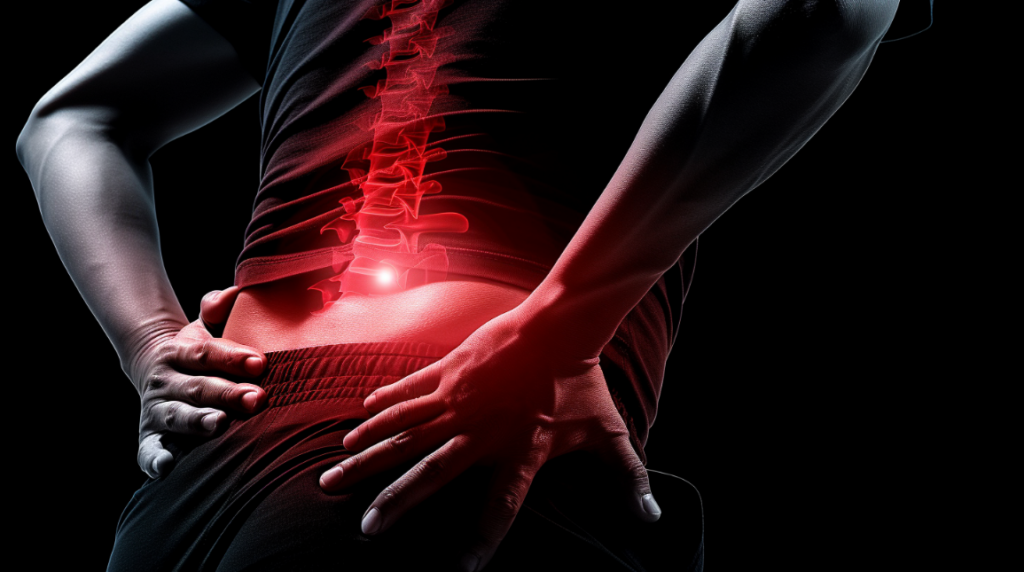
The journey to relieving pain caused by psoas trigger points begins with accurately locating these knots.
Due to the psoas muscle’s deep location, this task can be challenging but is crucial for effective treatment.
Pinpointing Psoas Trigger Points
Gently probing through the abdominal muscles can help identify tender or sensitive areas indicative of trigger points.
These spots may reproduce the familiar sensations of discomfort, signaling their presence.
Techniques for Trigger Point Release
Applying sustained, gentle pressure to identified trigger points can help alleviate the tension.
Tools such as a tennis ball or a specialized psoas release tool can aid in this process, allowing for deeper penetration and more effective release.
Following up with stretching exercises, particularly those that target the hip flexors, can further enhance muscle relaxation and prevent future issues.
When Professional Intervention Is Needed
While many individuals find success in self-treating psoas trigger points, certain situations warrant professional advice.
Persistent pain, worsening symptoms, or the development of numbness and tingling are signs that professional consultation may be necessary.
A healthcare provider can offer specialized treatments, such as manual trigger point release or dry needling, alongside advice on movement patterns to avoid recurrent issues.
FAQ
What is a psoas trigger point?
A psoas trigger point is a tight, sensitive area within the psoas muscle that can cause pain and discomfort locally and in distant areas due to referred pain patterns.
How do psoas trigger points cause referred pain?
Psoas trigger points can cause referred pain by stimulating nerve fibers in the muscle, which send pain signals to other parts of the body, often leading to discomfort in areas distant from the actual trigger point.
What are common symptoms of psoas trigger points?
Common symptoms include deep, aching pain in the lower back, pelvis, hip, or groin; referred pain to the abdomen, thigh, or lower leg; restricted hip or lower back mobility; and a feeling of tightness or stiffness.
How can you locate a psoas trigger point?
Psoas trigger points are typically located by palpating the abdomen and searching for tender spots deep within the muscle, often closer to the spine and below the belly button.
What techniques are effective for releasing psoas trigger points?
Effective techniques include applying direct, sustained pressure to the trigger point, stretching the psoas muscle gently, and incorporating strengthening exercises to improve posture and reduce stress on the muscle.
When should you seek professional help for psoas trigger points?
Seek professional help if the pain persists or worsens, if you experience numbness or tingling, or if self-treatment does not provide relief, as these may indicate a need for specialized intervention.
Can psoas trigger points affect your gait or posture?
Yes, psoas trigger points can lead to changes in gait or posture by causing pain and restricting movement, which may result in compensatory patterns that affect overall alignment and mobility.
How can you prevent the formation of psoas trigger points?
Preventing psoas trigger points involves maintaining good posture, engaging in regular stretching and strengthening exercises for the hip flexors and core, managing stress, and avoiding prolonged sitting or repetitive activities that strain the psoas muscle.

